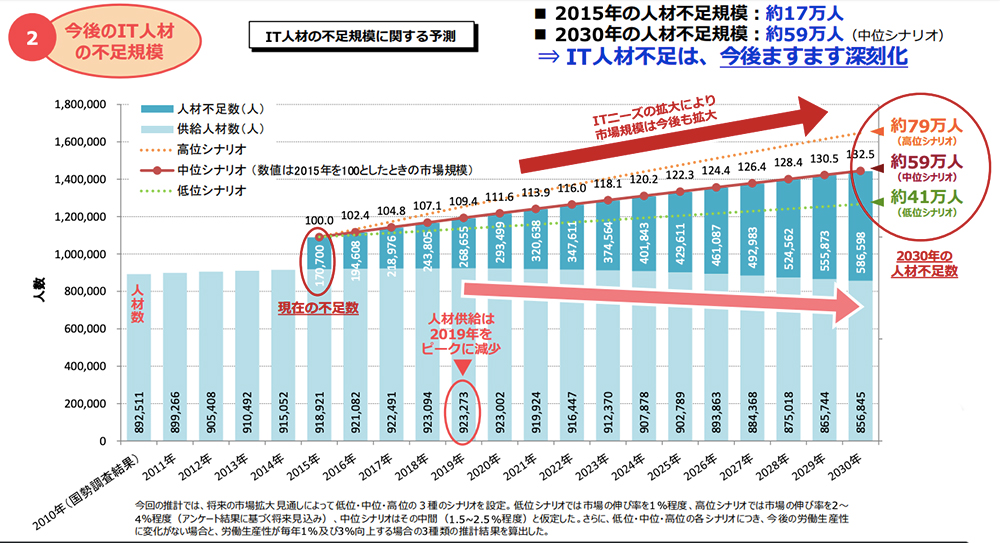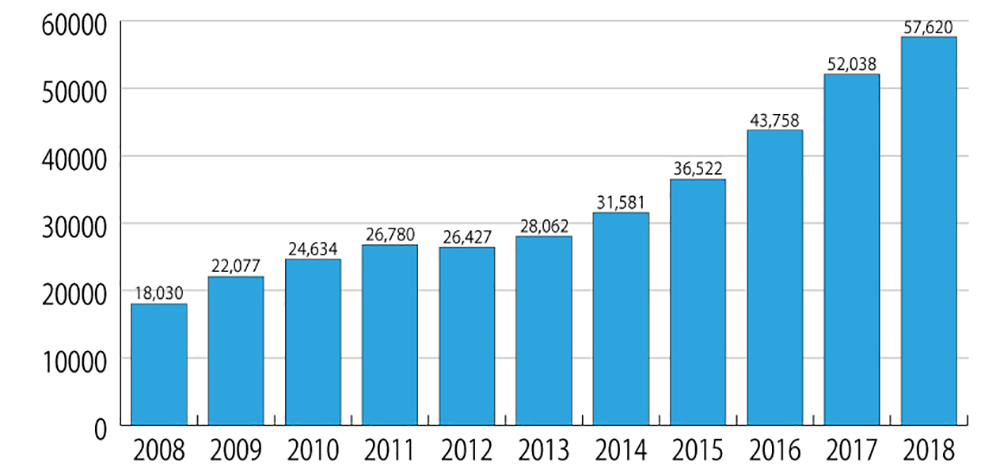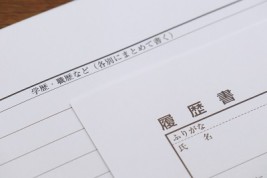While the IT market is expanding globally with the emergence of new technologies such as AI and IoT, the shortage of IT engineers has become a serious issue in Japan. To solve this shortage of IT engineers, the Japanese government and companies are considering using foreign engineers’ abilities. In this article, we will explain the reasons of why foreign engineers are needed in Japan and the advantages and disadvantages of working in Japan.
Contents
Why foreign engineers are needed in Japan
In recent years, many innovative IT technologies such as AI, IoT, blockchain and robots have appeared. Meanwhile, the demand for IT engineers is expanding as a business leader in response to the so-called “4th Industrial Revolution”. Despite this, the current situation is the lack of IT engineers in Japan.
Japan’s shortage of IT engineers has become serious.
Japan is aging with a declining birthrate and declining population at a much faster rate than other developed countries. While the demand for IT engineers is increasing, the number of new employees is decreasing, and the shortage of IT engineers will become more serious as the labor force decreases.
According to a survey conducted by the Ministry of Economy, Trade and Industry, there is about 170,000 shortage of IT personnel (*) in 2015, compared to about 900,000. In the future, the gap between supply and demand will continue to widen, and by 2030 it is predicted that there will be a shortage of about 410,000 (optimistic) to about 790,000 (pessimistic) IT human resources. In particular, the information security field will have a shortage of 193,000 in 2020, and the AI, IoT, and big data fields will have a shortage of 48,000 people in 2020.
Source:Ministry of Economy, Trade, Industry “Survey results on latest trends and future estimates of IT human resources”
※“IT human resources” refers to “human resources belonging to the information system department of IT companies and user companies”
The acquisition of foreign engineers is progressing.
A simple way to solve the shortage of IT engineers in Japan is to increase the supply. For this reason, there is an active movement toward the acquisition of new engineers. Acquisition of female engineers and senior engineers are also progressing, but as mentioned above, there is a limit to increasing the supply of IT engineers only in Japan, where population decline is inevitable. Now, the acquisition of foreign engineers is progressing.
More companies are actively hiring foreign engineers!
Japan’s leading IT company “Rakuten” uses English as its official language and actively recruiting foreign engineers. Most of the members of the freeware app for instant communication “LINE” are foreign engineers; the company is established in Kyoto where the development base (LINE KYOTO) is located. It was reported that nearly 80% of the approximately 1,000 applicants were foreigners. In the e-commerce company app “Mercari”, nearly 90% of the 50 newly hired engineers were foreigners.
In addition to these large companies, more and more companies are hiring foreign engineers in SMEs and venture companies.
“Points-based System for Highly-Skilled Foreign Professionals ” to receive preferential treatment for immigration
In Japan, the “Points-based System for Highly-Skilled Foreign Professionals” has started in 2012. The purpose of this system is to bring in talented people from overseas and revitalize Japan. By satisfying certain requirements, you can receive preferential treatment for immigration; IT talent like engineers are also eligible. The advanced human resource point system makes it easy for talented foreign engineers to work in Japan, and the number of given certifications is increasing year by year.
>> Click here for details of the advanced human resources point system
Number of foreign engineers working in Japan
According to a survey by the Ministry of Health, Labor and Welfare, the number of foreign workers working in the information and communications industry in Japan is increasing year by year. In 2018, it was 57,620, an increase of about 5,000 compared to the previous year (52,038). Compared to 2008 (18,030 people), it has increased over three times.
In terms of nationality, China has the largest number, followed by Korea, Vietnam, the United States, and the Philippines.
Pros of working in Japan for foreign engineers

Advantage 01: Employment is stable.
Although it is said that Japan’s particular employment practice of “lifetime employment” has collapsed, long-term employment practices remain in Japanese companies. Besides, there are few cases in which employees are dismissed at Japanese companies; unless there are serious violations of laws or contracts. The fact that employment is stable can be said to be a great advantage for foreign engineers who want to commit to the company for a long time.
Advantage 02: Education system is in order.
Many Japanese companies conduct extensive employee training on the premise of long-term employment. The contents of work and work processes are made into manuals, and Japanese companies are characterized by extensive training and OJT. For foreign engineers who want to utilize the learned skills and know-how acquired in Japan in their home countries, Japanese companies with a well-developed educational system are attractive.
Advantage 03: Earn more money than in your home country.
Many foreign engineers work in Japan to send money back to their home countries. Engineers’ salary levels vary from country to country, so it’s hard to say, but if Japanese salary levels are higher than your home country, working for a Japanese company should be a good choice.
Advantage 04: Public medical insurance is fulfilling.
As a general rule, foreigners working in Japan must pay insurance premiums and take out public medical insurance in the same way as Japanese. As a result, you can receive the same medical services as Japanese. Japan’s public health insurance system (universal public healthcare) is at the top level in the world. There are many countries where there is no system for public medical insurance or in many countries where the system has not yet matured, so there are many foreigners who feel that it is easy to use the full public medical insurance.
Advantage 05: There are many attractive things: Culture, Security, and Infrastructure.
In recent years, an increasing number of foreigners are interested in Japanese culture, manga, anime, Japanese food and traditional crafts. Many foreigners have the perception of “safety”, “good infrastructure”, “clean cities”, “friendly people” about Japan. Many foreign engineers choose to work in Japan to live in their favorite country.
Cons of working in Japan for foreign engineers

Disadvantage 01: Possible long working hours.
For many years, long working hours have become normal in many Japanese companies, especially in the IT industry. While recent work style reforms have made working hours more appropriate, there are companies unable to reduce working hours. Foreign engineers may feel dissatisfied with overtime, low salaries or not having enough private time.
Disadvantage 02: Some companies lack cross-cultural understanding.
In Japan, the phrase “When in Rome, do as the Romans do” is used. This is one way of thinking, but if you go too far, both workers and employers may not be able to respect the differences between their cultures and lifestyles and may become a problem. When working in Japan, the point is whether you choose a company with a system that can accept different cultures.
Conclusion
Japanese companies, mainly in the IT industry, are working to hire foreign engineers to increase their competitiveness. Increasing numbers of companies are promoting the internationalization of the internal environment to accept foreign engineers. In the future, the environment where foreign engineers can work easily will improve, and the field where foreign engineers can play an active role will expand more and more.
Big events in Japan like the 2019 Rugby World Cup, the 2020 Tokyo Olympic and Paralympic Games and the 2025 Osaka World Expo, are continuing to be held, and now Japan is attracting worldwide attention. Now that the whole country is showing great excitement, it is the best time for foreigners to work in Japan. If you like Japan and have aspirations to expand your career as an engineer, why don’t you try challenging to find a job or change your job in Japan?











